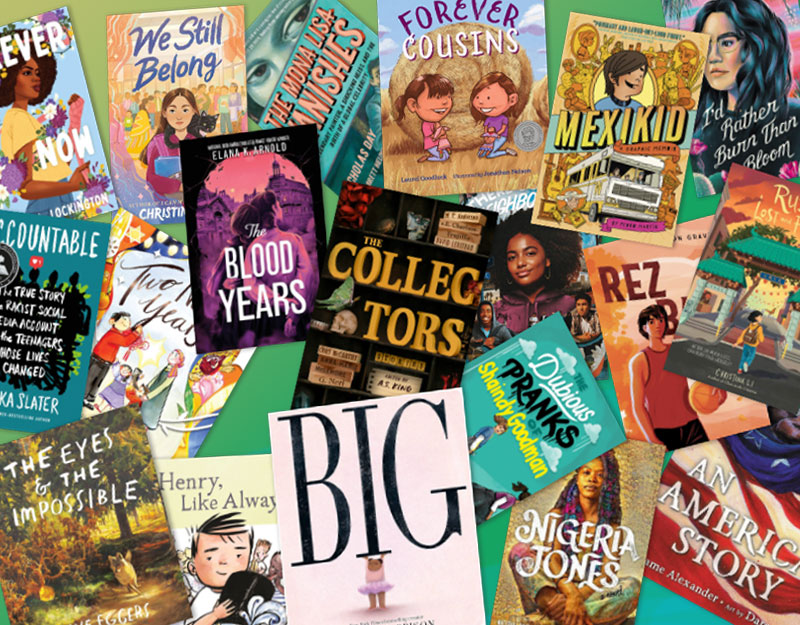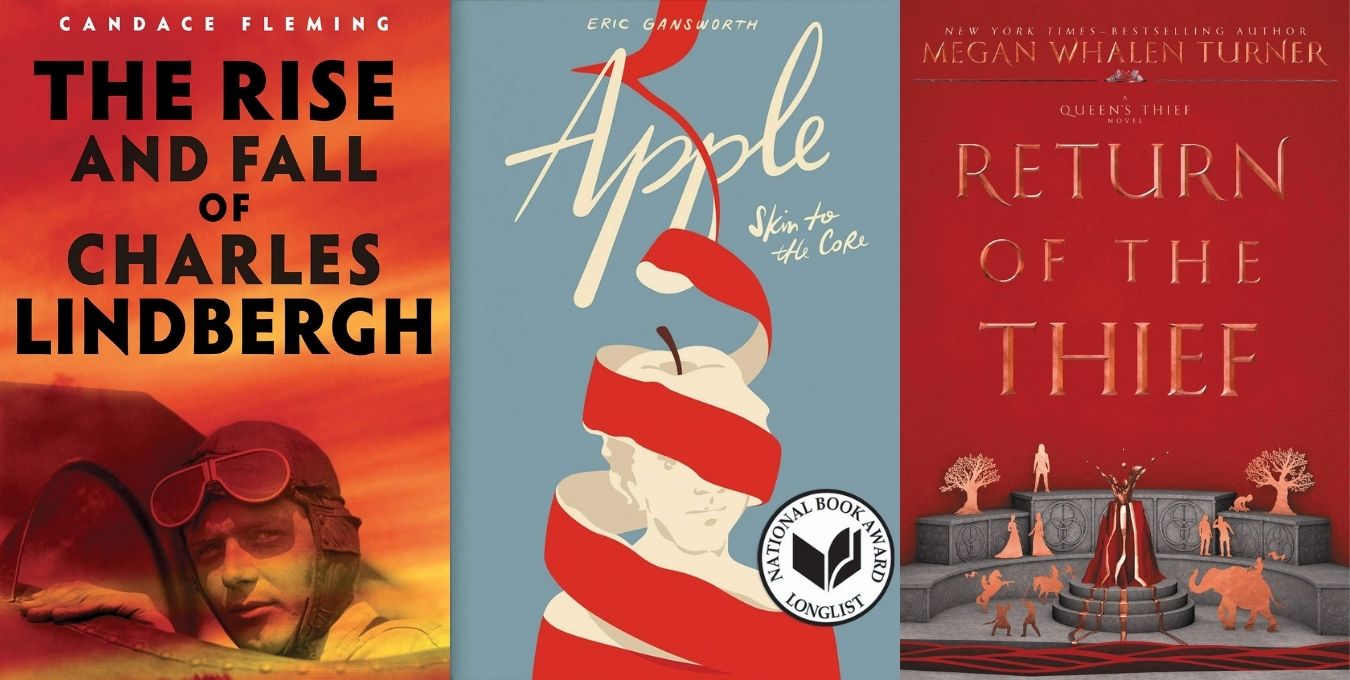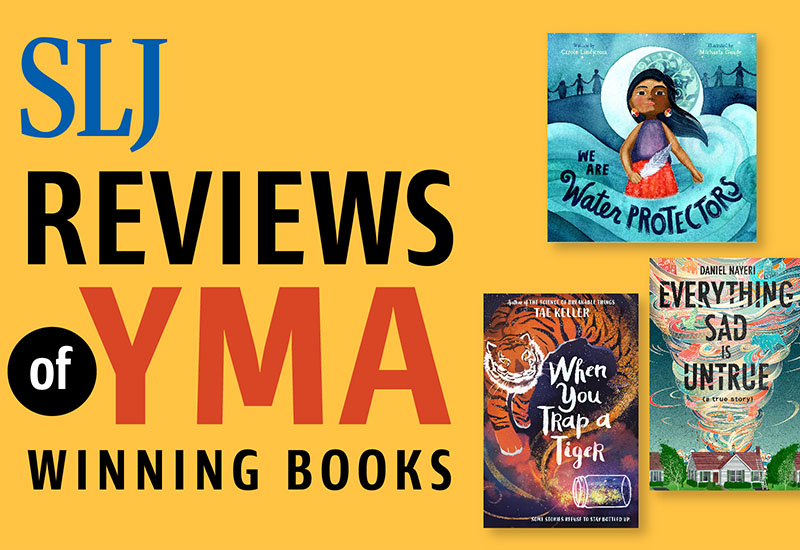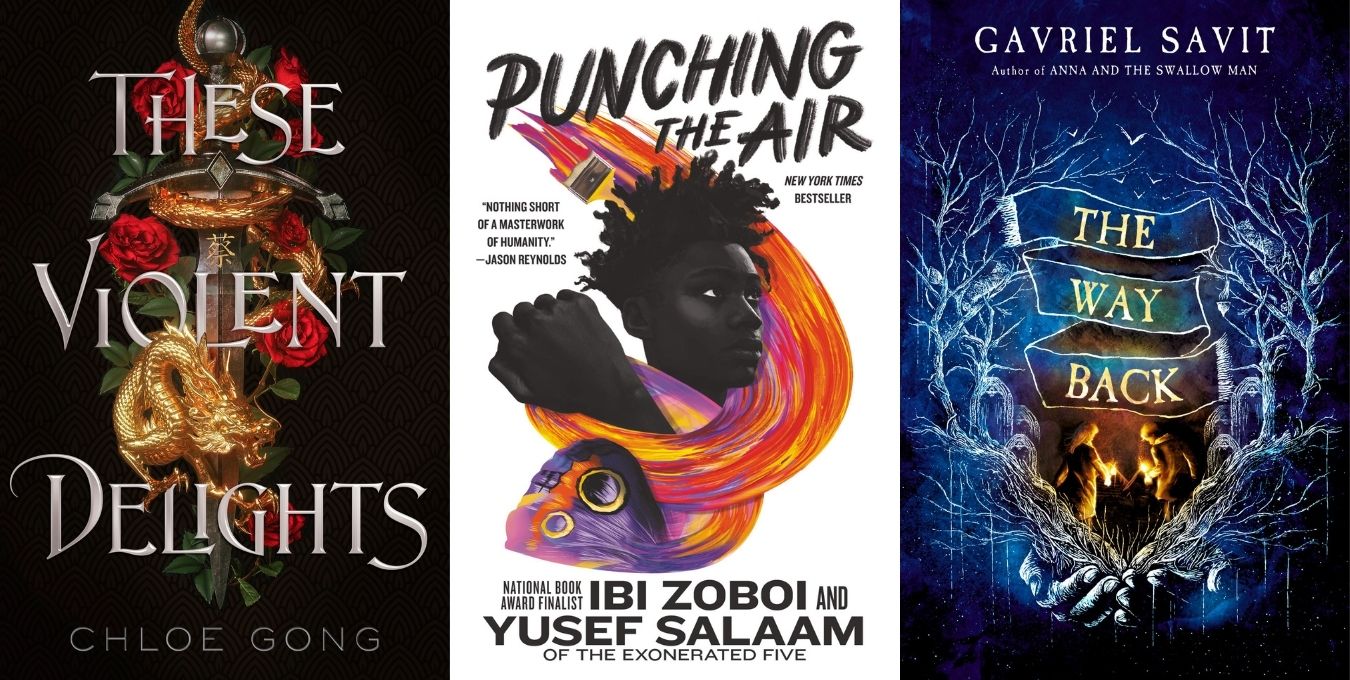Middle Muddle
Wendy wanted to know how I could possibly rate KEEPER higher than ONE CRAZY SUMMER, and now that I’ve reread both books, I can address that question.
 PLOT: The action of this story is very slight, but through the use of short chapters and numerous flashbacks, Appelt infuses it with lots of suspense. Ultimately, we want to know how Keeper will be saved from the boat, and along the way we hope to learn, first, the details of her fateful day and, second, the backstory of each of the individual characters.
PLOT: The action of this story is very slight, but through the use of short chapters and numerous flashbacks, Appelt infuses it with lots of suspense. Ultimately, we want to know how Keeper will be saved from the boat, and along the way we hope to learn, first, the details of her fateful day and, second, the backstory of each of the individual characters.
CHARACTER: The entire ensemble–Keeper, Dogie, Signe, and Mr. Beauchamp–is not only flesh and blood, but they grow and change over the course of the story, or rather our understanding of them grows and changes as we come to realize their true natures. The animal characters are also a nice addition.
ADVERTISEMENT
ADVERTISEMENT
SETTING: Whereas Turner vividly creates a vast world in A CONSPIRACY OF KINGS, Appelt works similar magic with a small stretch of Texas coastline, creating a world unto itself. The physical description of this place is woven throughout and complemented by occasional digressions into history and science such as the one we are treated to in chapter 19 which begins on page 72.
The Texas coast forms an arc, like a rainbow, hugging the salty water of the Gulf of Mexico, laden with redfish and electric eels and speckled trout, cabbage heads and jellyfish and flounders. Right there, nestled between Galveston to the north and Corpus Christi to the south, right at the foot of a salt grass marsh, lies a narrow strip of quiet beach, isolated but for an oyster shell road that starts inland from a tiny town called Tater.
But long before Tater . . .
STYLE: I think this quote also provides evidence of the prose style of Appelt: simple and direct, but also poetic, too. And, too, the story has the quality of a fable or magical realism.
THEME: I love how this little ensemble cast is a microcosm of the world: black, white, gay, straight, child, adult, human, animal, supernatural. All of the characters are yearning for love, and this really resonated with me in a powerful way. From page 260–
Love, thought Mr. Beauchamp. It’s not something to be put off. It’s too hard to find. The old man knew this to be a true thing: Don’t put off love, no matter what.
 PLOT: Like KEEPER, this is a character-driven story. Nevertheless, I do find elements of a distinguished plot. Of course, the enigma that is Cecile will keep the pages turning, but Williams-Garcia also keeps readers waiting to learn about the mystery of Fern’s name and what Fern saw at the bus stop. Still, I have to give the edge in this category to Appelt simply because she has more suspense despite less action.
PLOT: Like KEEPER, this is a character-driven story. Nevertheless, I do find elements of a distinguished plot. Of course, the enigma that is Cecile will keep the pages turning, but Williams-Garcia also keeps readers waiting to learn about the mystery of Fern’s name and what Fern saw at the bus stop. Still, I have to give the edge in this category to Appelt simply because she has more suspense despite less action.
CHARACTER: The edge in this category, however, goes to Williams-Garcia. The family dynamic between all these females (Big Ma, Cecile, Delphine, Vonetta, and Fern) is complex and intricate. Cecile has a distinctly different relationship with each of these girls and Delphine’s voice is able to capture that. Cecile reminds me slightly of Grandma Dowdel in A LONG WAY FROM CHICAGO; each interaction between her and the girls peels back another layer of the onion. The pivotal point is when Cecile gets arrested. To that point, the girls have been lukewarm about the Cecile and the message of the Black Panthers, but this event galvanizes them, and Williams-Garcia shows us this, rather than letting Delphine explicitly tell us.
SETTING: Williams-Garcia vividly captures the time and the place–and as Nina mentioned much of the setting is grounded in the Delphine’s voice, her perceptions of her world. I’d still give the edge to Appelt here, but I suspect this may have more to do with my preference for third person and the fantasy genre, so let’s generously call this a draw.
ADVERTISEMENT
ADVERTISEMENT
STYLE: It’s a strong narrative voice with intelligence, lots of humor, and a little bit of angst. I’m not partial to first person, but this one won me over, and I suspect that if I heard that audiobook that I may fall head over heels. I’m resistant to the voice of KEEPER, too, however, because it has a too-cute-for-its-own-good vibe that normally turns me off. I would call this, too, a draw.
THEME: This is really a coming of age novel, especially for Delphine, and being a fish out of water, so to speak, brilliantly brings this into sharp relief. During this one crazy summer, she learns quite a bit about her mother and quite a bit about the world, and these themes dovetail very nicely. On the first read, I preferred theme in KEEPER, but this one has grown on me tremendously in the second read, and thus the jury is still out . . .
CONCLUSION
So, yeah, I’d probably still pick KEEPER, but not by much. Not by much at all, and I can be convinced to go the other way. A CONSPIRACY OF KINGS and SUGAR CHANGED THE WORLD are still stuck at the top of my list, but I suspect those will be a chore to build consensus around (ditto for the picture books), so when it comes to middle grade fiction I do think these are two of the finest offerings of the year, and I can get behind both. Still need to reread THE DREAMER and THE KNEEBONE BOY, though. So perhaps my realignment is not yet finished.
I am left with the sense, however, that in comparison to last year where WHEN YOU REACH ME was clearly in a class by itself (in terms of middle grade fiction), whatever might be deemed the best middle grade fiction this year will simply be first among equals. Over to you, Wendy. Why is it “inexplicable” that I should prefer KEEPER to ONE CRAZY SUMMER (or THE KNEEBONE BOY)?
Filed under: Uncategorized
About Jonathan Hunt
Jonathan Hunt is the Coordinator of Library Media Services at the San Diego County Office of Education. He served on the 2006 Newbery committee, and has also judged the Caldecott Medal, the Printz Award, the Boston Globe-Horn Book Awards, and the Los Angeles Times Book Prize. You can reach him at hunt_yellow@yahoo.com
ADVERTISEMENT
ADVERTISEMENT
SLJ Blog Network
One Star Review, Guess Who? (#202)
Review of the Day: My Antarctica by G. Neri, ill. Corban Wilkin
Exclusive: Giant Magical Otters Invade New Hex Vet Graphic Novel | News
Parsing Religion in Public Schools
Take Five: LGBTQIA+ Middle Grade Novels
ADVERTISEMENT








Ouch, did I really say “inexplicable”? Maybe I was just trying to goad you into a post like this.
I think there’s a lot of personal preference that comes into play, but I found Keeper lacking in presentation of plot. It felt, to me, like “she’s in the boat. Still in the boat. With a plan. Still in the boat, with the plan.” This didn’t create suspense for me, perhaps because I never had any doubt that eventually she’d be back on dry land and all would be well. Maybe I should have–this is Appelt, an author who KILLS CATS–but any sense of danger was lost on me. The side plot of Jack and Mr. Beauchamp read far better, and even the lightly-developed side plots of Signe and Dogie and Signe and Keeper’s mother.
This goes into style. I’m not often into poetic writing, and so I wasn’t crazy about the writing style in Keeper, but mostly I just felt it was way too long. For such a slight plot, the book goes on for a lot of pages. One Crazy Summer is tighter, without many wasted words. I like Keeper in the parts where something is happening.
I’m not hugely enthusiastic about One Crazy Summer. I think it’s a good book, and I don’t think it’d be out of place in the Newbery canon. As a “book to read”, I prefer Kneebone Boy, but I acknowledge reluctantly that it doesn’t seem quite as finely crafted as One Crazy Summer–again, we come to “wasted words”, clarity of style and theme and character. And honestly–I say this as someone who never read any of Turner’s other books–A Conspiracy of Kings is probably the sparkling jewel among the fiction I’ve read this year. I didn’t love it, it isn’t my thing (why I never felt any interest in this series before), but the overall impression I get is of Quality. I can’t quite put my finger on it, but this book made me think of books by our best writers–Elizabeth George Speare, Susan Cooper, Eloise Jarvis McGraw, and so on–in its richness of plot, character, and setting.
As I said in my first post, the pacing of KEEPER is molasses-slow, and it’s probably the biggest sticking point for me. At best, I think it simply limits the book to a narrow audience than it could have reached with either more action or fewer pages. At worst, I think it’s the biggest flaw of the book. I always start reading this book thinking it’s too long, that some of these pages need to go, and then about 1/3 through, I stop caring. But while, the *pacing* is slow, the plotting (i.e. the arranging and sequencing of the events in the plot) is done to maximum effect. I don’t think we ever question whether Keeper will not be safely rescued from the boat, but we read to know (a) just *how* she will be rescued and (b) just what got her there in the first place. Once, we learn how she botched the gumbo, broke the ukelele, and cracked the flower pots, then we are lead to more and more questions about the individual backstory of each character. It’s not an insistent page-turning suspense, but it’s just enough to keep me invested in the story when I otherwise might have put it down. If Appelt had told this strictly chronologically, then it would have started with Henri and Jack, then Signe and Dogie, and finally Keeper; arranged that way without any sense of mystery to draw the reader forth, I think the 400 pages could have felt torturous rather than leisurely.
Well, you’re preaching to the choir, obviously, in regard to the Turner. High fantasy has won three Newbery Medals (Lloyd Alexander for THE HIGH KING, Susan Cooper for THE GREY KING, and Robin McKinley for THE HERO AND THE CROWN). Despite the genre’s resurgence in popularity, it’s been shut out of the Medal for about 25 years now. To me, Megan Whalen Turner belongs in that select group (but then I think Ursula LeGuin belongs in that group, too), and maybe it won’t happen with A CONSPIRACY OF KINGS, but I would like to see shiny gold on a Turner book by the end of the series. Not that this paragraph had anything whatsoever to do with Newbery criteria . . .
I have to admit reluctantly (having been such a huge fan of The Underneath) that this book did feel very, very slow. The kids I know who have read it (and me, for that matter) really get bogged down when she is on that boat — feels endless. I did love the ending though and have told kids to stick with it for that. They always agree that it was worth it.
It is interesting to compare this to another 2010 book where there is also a sense of time passing slowly. That is Linda Sue Park’s A Long Walk to Water. I think it is more effect in that one. I’m not quite sure why (but admit I haven’t reread the book) it was necessary to draw out the boat part in particular quite so much. That said, I do love the writing; I’m a sucker for poetic atmosphere of this sort. Beautifully done.
I’m not sure the pacing of KEEPER is a problem for young readers. I have an eighth-grade student who rarely finishes a book, and her best friend bet her she wouldn’t/couldn’t read KEEPER. Well, she did, and she has gone on to read more books, KEEPER being a pivotal book for her in her new life as a reader! Had she found the book slow, she would have lost the bet, I’m sure.
Dean, that is fascinating because my two very strong fourth grader readers had such a very different response. So perhaps even though the main character is more their age it is still more suitable for older readers like your eighth grade student.
I agree with both Monica and Jonathan. I couldn’t quite shake my UNDERNEATH infatuation enough to put KEEPER at the top of my list. But I’m totally with Jonathan’s assesment of the world building Applet managed. I’m hoping there will be at least one more ramshakle cottage left on the spit when it come time for me to retire.
I agree that the “boat” situation definitely dragged on for longer than it should have. I thought One Crazy Summer actually had more “suspense”. I worried about what would happen to Cecile after she was arrested and thought of how the children could make it back home after Cecile’s arrest. I also continually wondered what the children would eat and what would happen on their travels around the city. As several have noted, Appelt does make up for her slow main plot with the side plots. I’m not sure that I would edge Keeper above One Crazy Summer, but I would still wish it well in the Newbery race.
Perhaps suspense is the wrong word. When you describe what drove you to keep reading ONE CRAZY SUMMER, Angela, all of the things you mention relate to character. You are invested in the characters and want to read more about them. This is an excellent mark of characterization and character development. But it doesn’t mean ONE CRAZY SUMMER is necessarily distinguished in terms of plot. In fact, the novel is told in chronological order from a single viewpoint with (a) what Fern saw and (b) Cecile’s name issue being the sole revelations deliberately held from the reader. (Compare and contrast this with the number of things concealed in Sophos’s first person narration.) Appelt could have chosen to eschew all those flashbacks in favor of a strict chronological retelling, but that would have sucked all the revelations out of the story. It’s a simple story, but the narrative structure, how she chose to tell the story, is what makes it distinguished. I think the pacing of KEEPER is going to be a subjective issue, and I’d imagine the committee is going to try this book out on a variety of children to gather reader responses.
Jonathan, it sounds like you’re saying that a non-chronological plot is more distinguished in-and-of-itself–that it’s somehow more sophisticated or challenging. Williams-Garcia uses characterization and setting to further and develop her plot. I don’t have anything against non-chronological plots, but I will note that Williams-Garcia didn’t need any tricks, didn’t need to rely on a complex structure to add interest to the plot.
I don’t think the question of whether the pacing in Keeper is a flaw is so subjective as all that–no more than any of these other points are subjective, since in the end they do come down to “I find the ___ in ___ more distinguished than the ___ in ___”. In an attempt to guard against my own preference for shorter books, I looked at the pacing this way: what would be lost in the book if the main-story sections were shorter (or tighter, or fewer)? My answer: nothing. I flail a little bit to find a slow-moving book that I think benefits from its slowness (prejudiced by those personal preferences of mine). Staying pretty close at hand, I think of The Underneath; it’s also slow-paced and poetic, but the slowness there has a mesmerizing effect that’s at least as much a part of the book as the plot itself. It sinuously draws the reader in deeper, gives a small feeling of safety–“maybe nothing else is going to happen”–that is shattered. Another one that comes to mind is White Sands, Red Menace. My sister likes the slow pacing of that book, though I don’t, because it mimics the feeling of that post-war era; the pacing of that book compared to the quicker-paced Green Glass Sea correlates to how the characters might have felt in the quiet years that followed the drama of the war. It doesn’t make me love the book, but I can see that it’s a feature, not a flaw. I know you agree that the pacing of Keeper may be its biggest flaw, but putting that aside, can you spin it as a feature?
Nonlinear plots are not intrinsically more sophisticated or challenging. THE HUNGER GAMES, THE GOLDEN COMPASS, and HARRY POTTER AND THE SORCERER’S STONE are all books that leap immediately to mind: excellent plotting with a single narrative thread. The plot of ONE CRAZY SUMMER is good, but not great. I’m not sure what you mean when you say that Williams-Garcia uses character and setting to further develop her plot, but I just want to make sure we can really see all the distinugished elements here. It can’t all be smoke and mirrors (e.g. the voice is part of the setting, the setting is part of the plot, the plot is part of the voice).
When I started KEEPER a second time, I was determined to find 50 to 100 pages to jettison from this novel. When I started I did find some I thought were extraneous, but the further I read, the more I got caught up in it all. When I’m in the novel it doesn’t bother me, but I always think it could have been shorter. The same thing sort of happened with me on ONE CRAZY SUMMER. I started it a second time, thinking it was on the slow side, and the plot didn’t get me excited, but the characters gradually drew me into the story, and made me keep reading.
I generally agree with what’s been said–the worldbuilding is fantastic, the relationships are well-detailed (and Mr. Beauchamp and Jack are heartbreakingly beautiful and wonderful) but it drags. As for expectation and suspense, I kept feeling that of *course* she was going to make it home, but I dreaded an anticipated over-tidiness–I didn’t see a way she could rescue Keeper that wouldn’t feel too perfect (and I can’t say she saw one, either).
And, of course, I think the animal narrators were cutesy and annoying, but I’ve copped to that being my personal dislike of animal narrators and ambivalence toward pets.
One Crazy Summer I enjoyed more (though I wasn’t blown away by it), but I didn’t find it suspenseful. To me, it was a really well-written, well-characterized slice of life, a slice of life that was formative to its narrative. And that was enough; it didn’t need suspense.
I’d like to comment on Keeper. I felt the story moved ahead, if I can get away with this, like a boat caught in an eddy. We swirled around and around and each time we went deeper into the water/story/lives of the characters involved. It was like a play where layers of the onion are peeled away. There was a cumulative effect as more and more was revealed that made me more and more involved. Girl messes up and searches for missing mother to make things right – that’s the simple plot outline, but how much richer the story became as Appelt kept taking us back before the day of the boat event until we understood the impact on everyone in this small community.
Blakeney, I LOVE your take on the pacing. Makes complete sense to me. Sort of like waves too. Beautiful. If I were to reread the book, I’d take this into account and I bet it would make it a far more satisfying reading for me the second time round as I’d now understand much better Keeper’s time on the boat.
Blakeney, I, too, love your take on the pacing of KEEPER. I’d been thinking about the waves, but couldn’t find a way to articulate it as eloquently as you have. Still, I vacillate between whether that excuses the slow pacing entirely or not. A livelier pace would likely broaden the child audience, but, but, but . . .
Character and voice–and setting, to a lesser degree–are where ONE CRAZY SUMMER lays claim to most distinguished. It has a good plot, just not as good as A CONSPIRACY OF KINGS or SUGAR CHANGED THE WORLD.